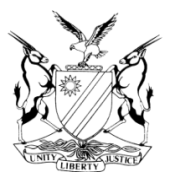5
REPUBLIC OF NAMIBIA

IN THE HIGH COURT OF NAMIBIA, MAIN DIVISION, WINDHOEK
REVIEW JUDGMENT
Case Title: S v SIMON HAINGURA | CR NO: 51/2021 High Court Ref.No.:620/2021 | |
Division of Court: Main Division | ||
Heard before: Honourable Mr Justice Liebenberg et Honourable Mrs Justice Shivute J | Delivered on: 2 June 2021 | |
Neutral citation: S v Haingura (CR 51/2021) [2021 ] NAHCMD 270 (2 June 2021) | ||
| IT IS ORDERED THAT:
| ||
Reasons for the above order: | ||
SHIVUTE J ( Liebenberg J concurring): [1] The accused was charged with reckless or negligent driving, contravening section 80 (1) read with sections 1, 49, 50, 51, 80(3), 86, 89,106,107 and 108 of the Road Traffic and Transportation Act 22 of 1999 as amended. [2] After the court invoked the provisions of s 112(1) (b) of the Criminal Procedure Act 51 of 1977, the accused was convicted as charged. [3] The accused was sentenced as follows: [i] According to the review sheet he was sentenced to N$6000 or 6 months’ imprisonment, wholly suspended for 3 years on condition that accused shall not be convicted of negligent driving committed during the period of suspension. [ii] Whilst the court order dated 23 February 2021 reads that the accused is sentenced to N$6000 of which N$6000 is suspended for a period of 3 years on condition that the accused is not convicted of reckless driving committed during the period of suspension. or 12 months’ imprisonment of which 12 months are suspended for a period of 3 years on condition that the accused is not convicted of reckless driving committed during the period of suspension. [4] I directed the following queries to the learned magistrate: Why was the accused convicted on both reckless and negligent driving? Why did the learned magistrate impose two different sentences on the accused in respect of one count? Finally, why did the learned magistrate not invoke the provisions of s 51 of Act 22 of 1999? [5] The learned magistrate responded as follows: ‘I concede that there was indeed an omission, the accused was convicted of reckless driving. The sentence imposed is N$6000 or 12 months’ imprisonment which was wholly suspended for 3 year on condition that the accused is not convicted of reckless driving in contravention of section 80(1) of the Road Transportation Act 22 of 1999 committed during the period of suspension. With regard to the provisions of s 51of Act 22 of 1999, were not invoked as no such application was made to the court.’ [6] Section 80(1) of Act 22 of 1999 creates two separate offences of reckless driving and negligent driving and the legislature never intended that such offences be regarded as one offence. [7] The learned magistrate in responding to the query, said he had convicted the accused of reckless driving. However, this is not borne out by the record. The record reflects that the accused was convicted as charged. [8] In fact, upon a closer perusal of the record, the learned magistrate convicted the accused of both reckless and negligent driving and this resulted in the court imposing two different sentences one in respect of reckless driving and the other in respect of negligent driving. [9] The learned magistrate when questioning the accused in terms of s 112 (1)(b) of Act 51 of 1977, it is incumbent on him to inquire and be provided with sufficient facts in order for the court to make a determination as to which offence the accused is pleading guilty to. It was wrong on the part of the learned magistrate to convict the accused on both reckless and negligent driving. The correct approach is for the court to make a finding on whether the accused concerned, drove the vehicle in a reckless manner or drove it in a negligent manner. The learned magistrate misdirected himself by convicting the accused as charged. Therefore, the conviction and sentence cannot be allowed to stand. [10] With regard to the query that the court did not apply section 51 of Act 22 of 1999, although the conviction and sentence have been set aside, I am puzzled by the learned magistrate’s response that he did not apply the provisions of section 51 because the prosecutor did not apply for it. I will discuss this for academic purposes. [11] Section 51 of the Act deals with the suspension of licence upon conviction of certain offences. ‘(1) where a person who is the holder of a driving licence is convicted by a court of an offence- (a)… (b) under section 80(1) of driving a vehicle recklessly; or (c)… The court shall, apart from imposing a sentence and except if the court under section 50(1) (a) issues an order for the cancellation of the licence, issue an order whereby every driving licence held by such person is suspended in accordance with the provisions of subsection 2. (2) An order of suspension pursuant to subsection (1) shall be made for such period as the court may determine, but which shall not be less than – ‘ [12] The word ‘shall’ in section 51 (2) of the Act makes it mandatory for the court to suspend a driver’s licence. [13] In the premise, the following order is made :
| ||
NN SHIVUTE JUDGE | J C LIEBENBERG JUDGE | |